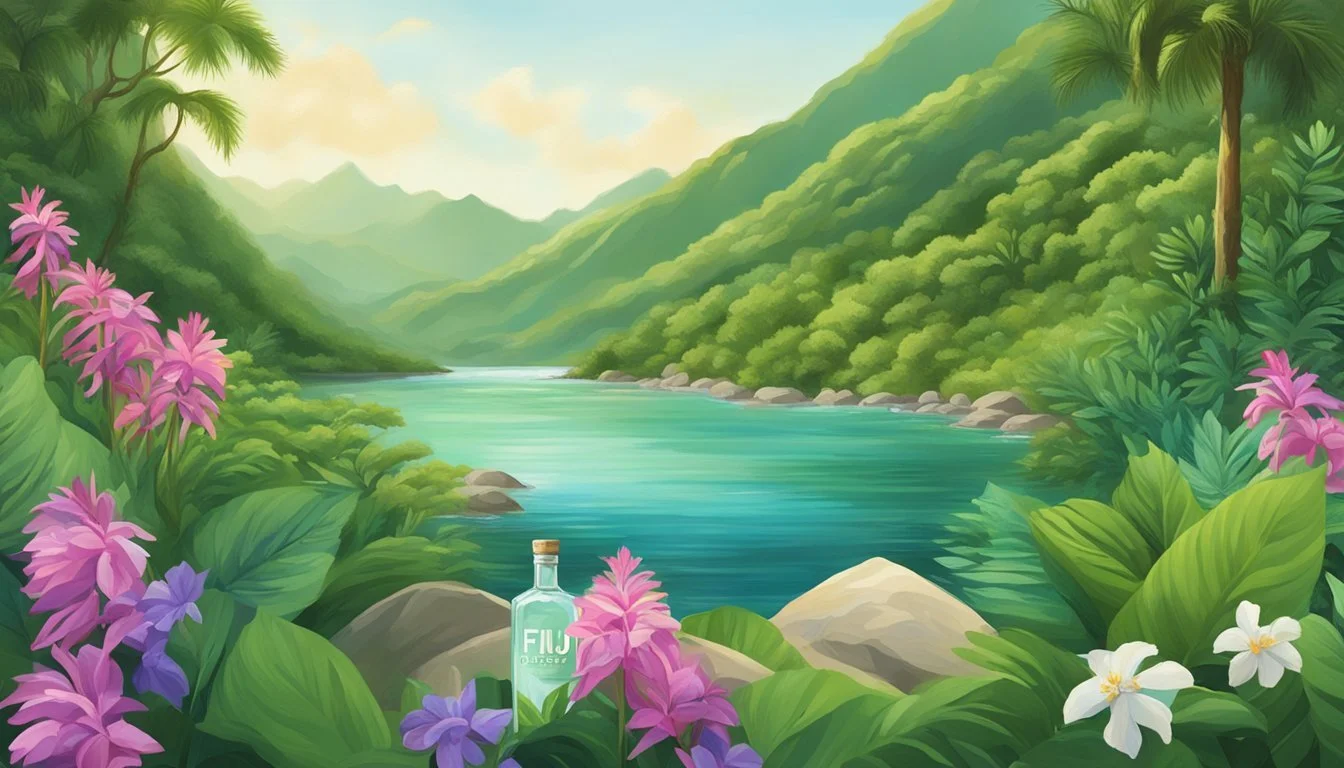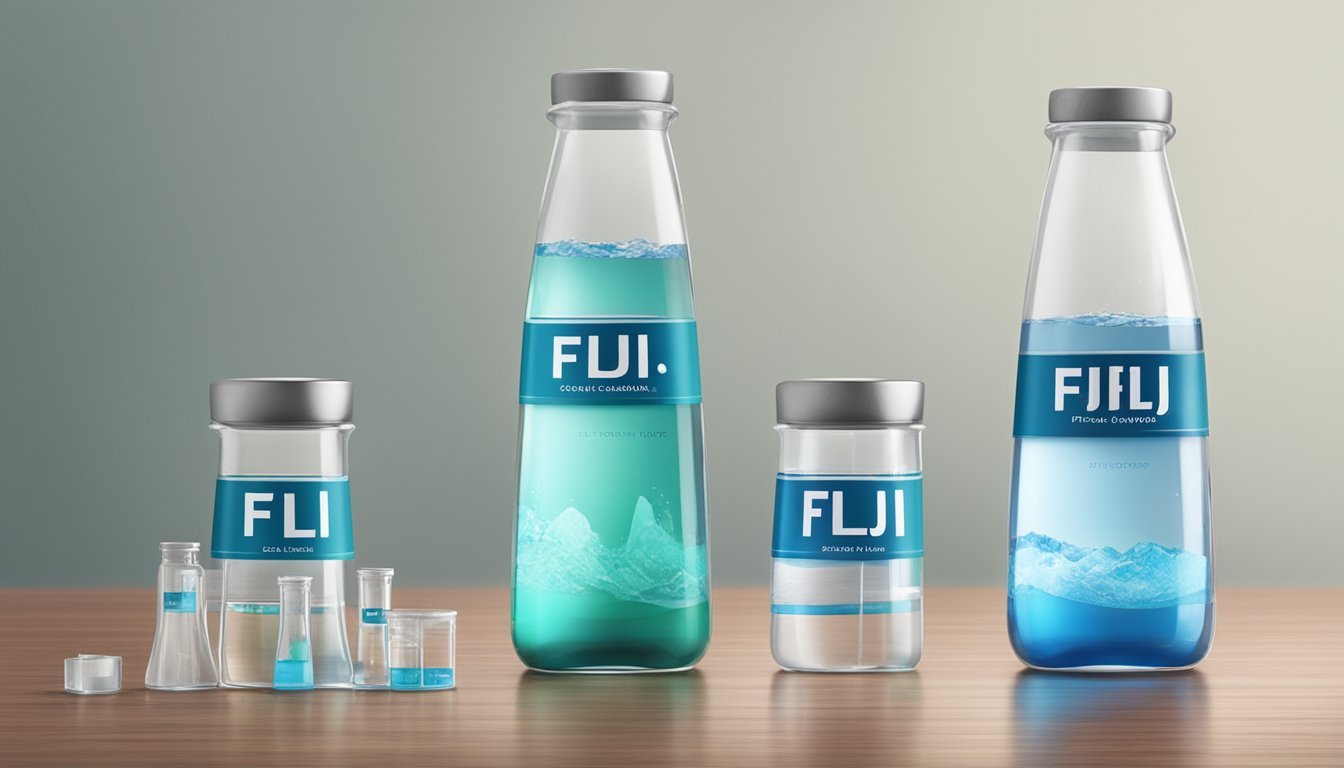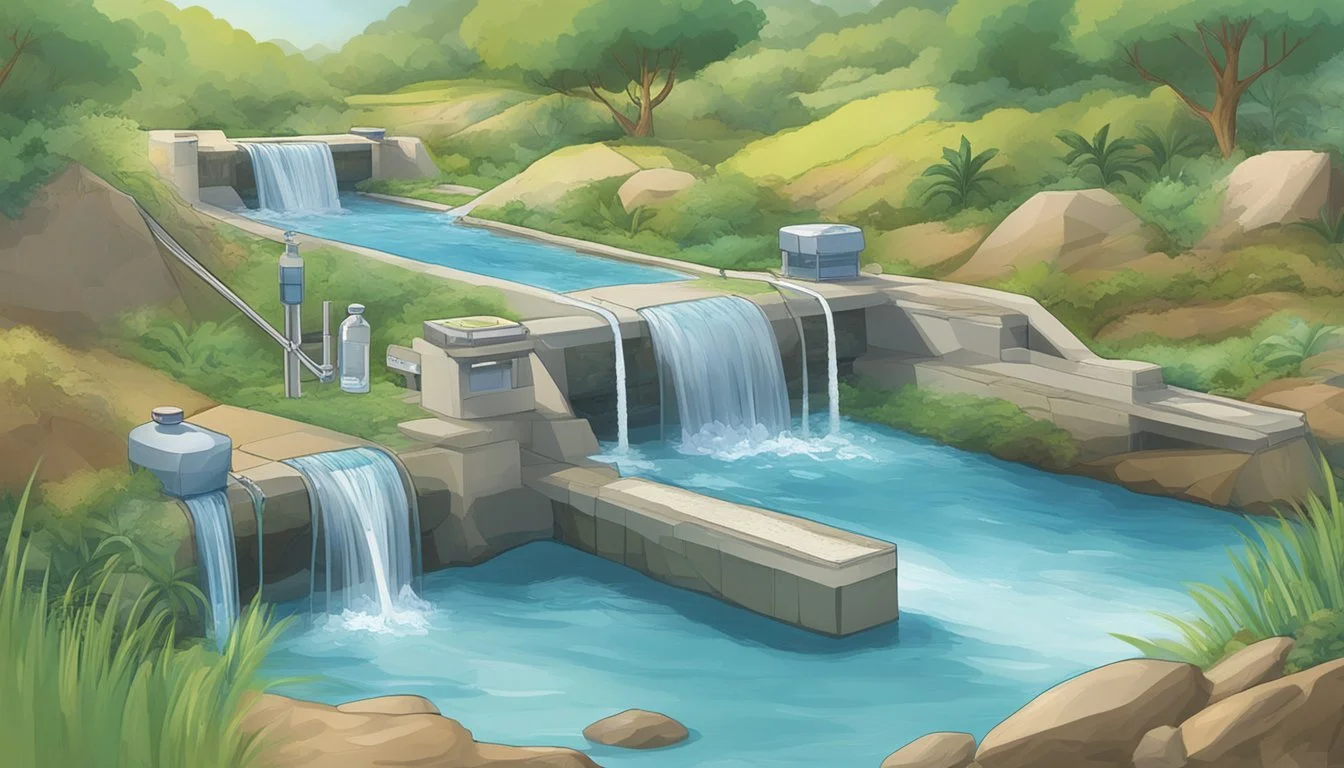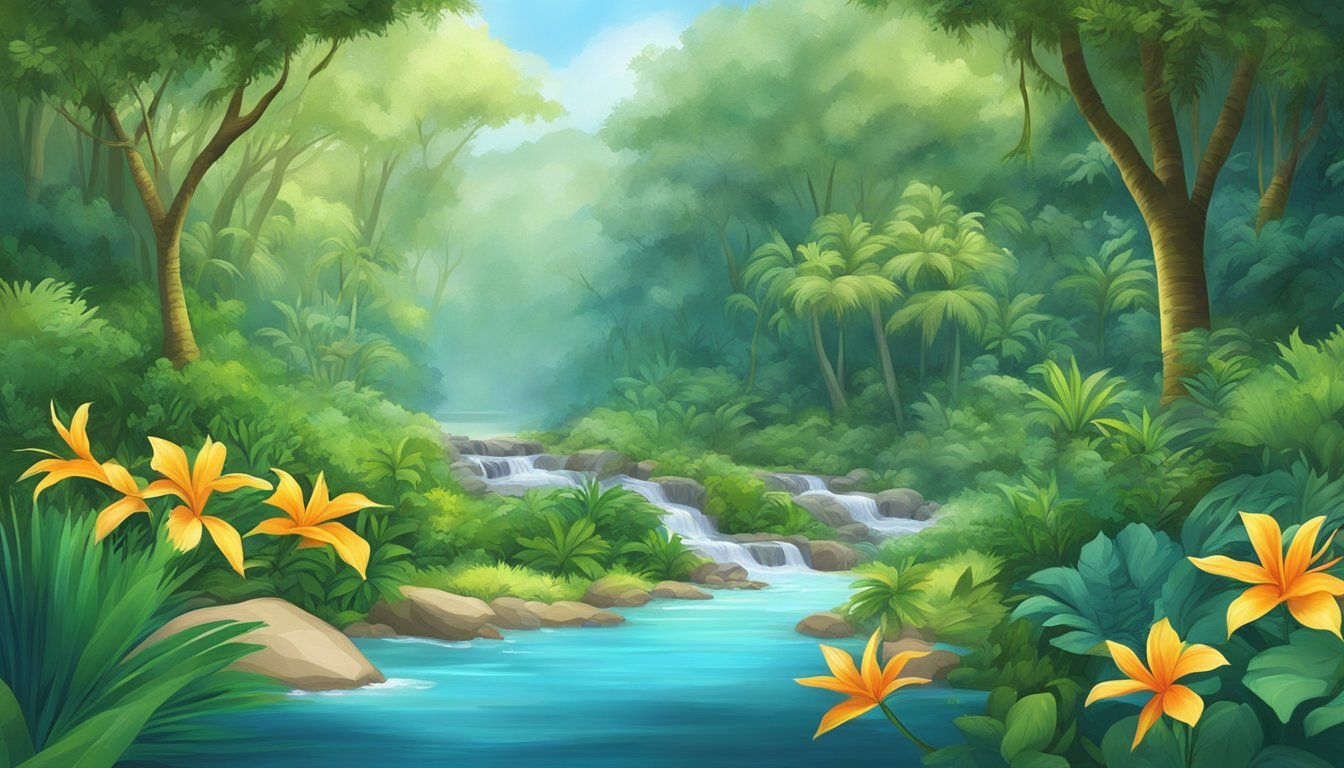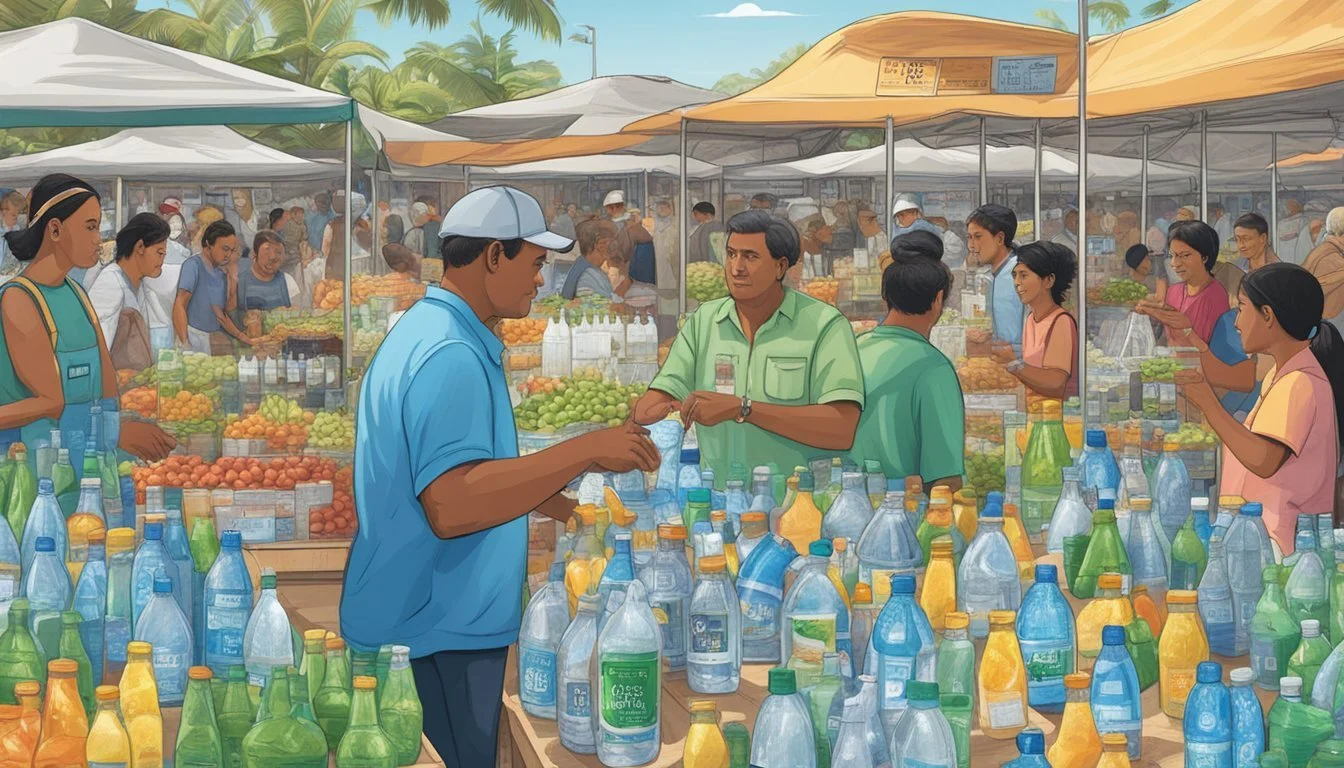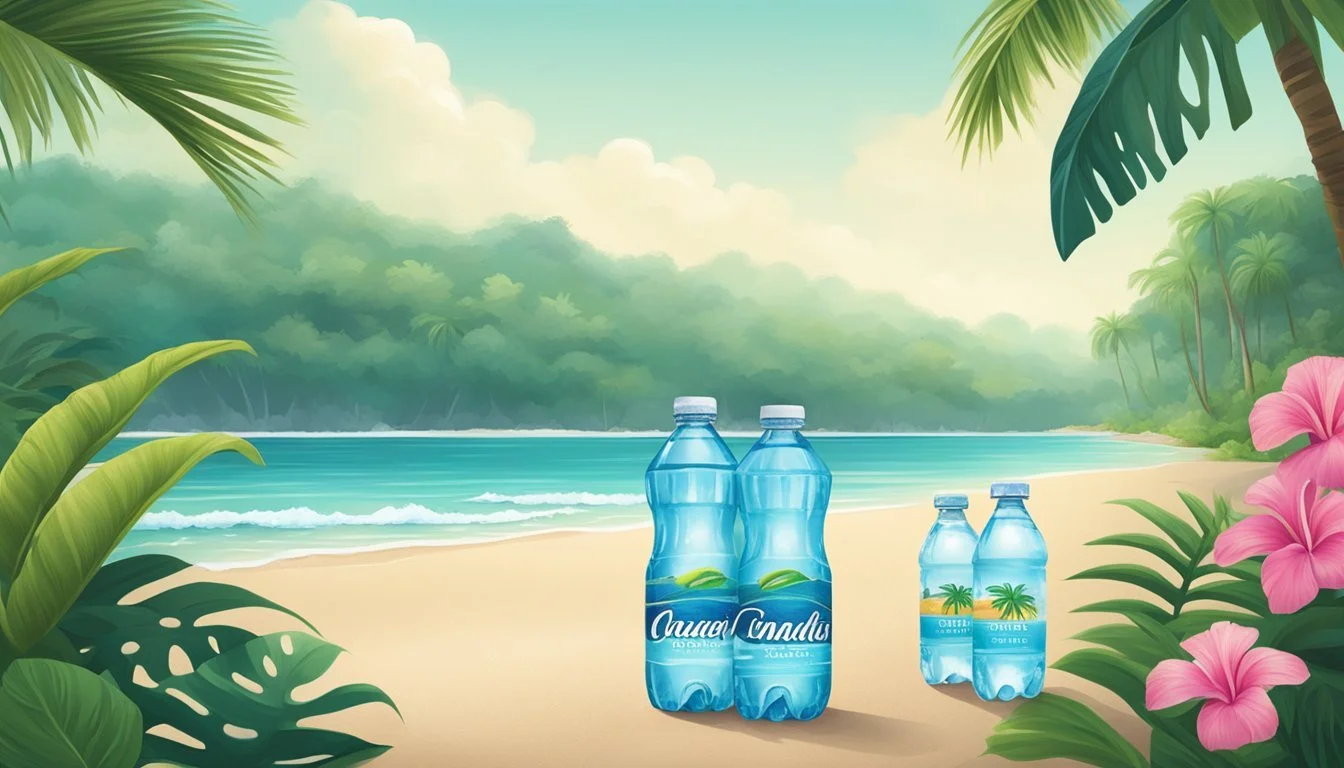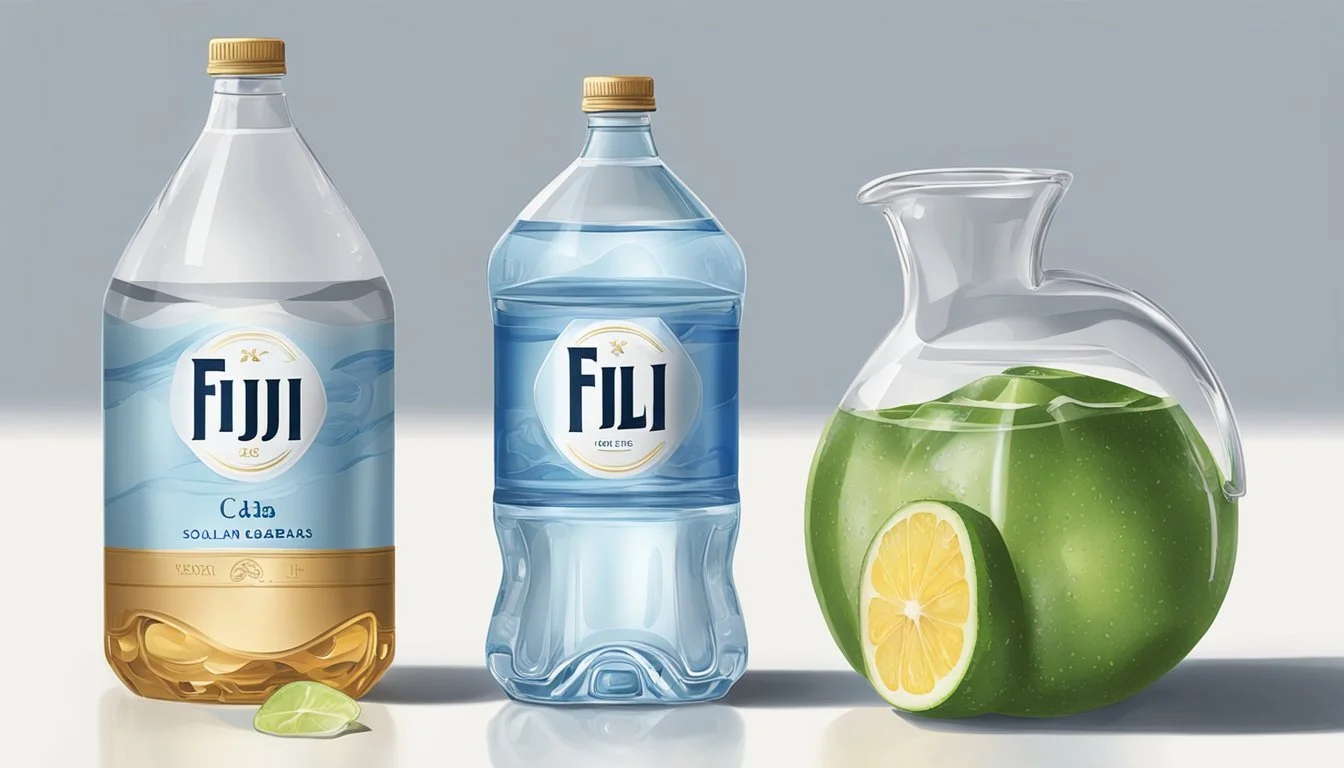Fiji vs. Solán de Cabras
Comparing Top Bottled Waters for Quality
When it comes to premium bottled water, Fiji and Solán de Cabras often stand out as top contenders. Each brand offers distinct characteristics that appeal to different consumers. Fiji Water is known for its soft, smooth taste and the unique mineral profile it gets from being sourced from an artesian aquifer in Fiji. It boasts a high silica content that contributes to its clean and crisp flavor.
Solán de Cabras, on the other hand, is sourced from a natural spring in Spain and is often praised for its balanced mineral content and subtle taste. The water comes in an iconic blue glass bottle, symbolizing purity and luxury. Solán de Cabras stands out for its unique bottle design and the premium feel it offers at first glance.
If you're choosing based on taste and mineral content, Fiji Water's soft and crisp profile might take the edge. Conversely, if you prefer a more balanced taste and elegant packaging, Solán de Cabras may be your best bet. Each brand excels in different areas, making the choice a matter of personal preference and priorities.
History and Origin of Bottled Waters
Bottled waters have rich histories deeply rooted in their geographical origins. Fiji Water and Solán de Cabras represent two unique stories of water sourcing and cultural significance.
Fiji Water: From Tropical Rainfall to Iconic Bottles
Fiji Water starts its journey on the remote island of Viti Levu in the South Pacific. The water originates from equatorial trade winds that carry purified clouds over Fiji. As tropical rain falls onto the island's pristine rainforest, it filters through volcanic rock to reach an underground aquifer.
This aquifer is tapped to bottle the water, ensuring it remains untouched until consumption. Introduced in 1996 by a Canadian entrepreneur, Fiji Water quickly gained a reputation for its high-quality and distinct branding.
The company emphasizes its untouched nature, appealing to consumers seeking pure, natural water. Its iconic square bottle and status symbol reputation have made it a popular choice among premium bottled waters.
Solán de Cabras: Spanish Heritage and Water Purity
Solán de Cabras has a long history dating back thousands of years. The water is sourced from a natural spring in the Serranía de Cuenca region of Spain. This region experiences thunderstorms that recharge the aquifer, ensuring a consistent supply of fresh water.
The spring water's purity has been recognized since Roman times, and its mineral content is considered beneficial for health.
In modern times, Solán de Cabras is bottled in its signature blue glass bottles, known for preserving the water's quality. It stands out for its commitment to purity and heritage, appealing to consumers who appreciate natural and historically significant sources. The brand's extensive history underscores its dedication to maintaining water quality and authenticity.
Physical and Chemical Composition
Both Fiji and Solán de Cabras offer unique compositions of natural minerals and electrolytes, which play a significant role in their taste and health benefits.
Natural Minerals and Electrolytes
Fiji Water contains a variety of essential minerals and electrolytes, including magnesium, calcium, potassium, and silica. These minerals provide health benefits such as improved nerve function, bone health, and electrolyte balance. Specifically, Fiji Water offers 14.7 mg of magnesium, 17.9 mg of calcium, 4.9 mg of potassium, and 93.4 mg of silica per liter.
Solán de Cabras also boasts a rich mineral profile. This water originates from the Cuenca mountains in Spain and is heralded for its purity. Its mineral content includes calcium, magnesium, sodium, chloride, and sulfate. The combination of these elements contributes to its clean and refreshing taste, highlighting its authenticity and natural origin.
PH Level and Its Impact on Taste
The pH level of bottled water determines its acidity or alkalinity, which can influence taste. Fiji Water has a pH level of around 6.96, making it slightly acidic. This subtle acidity contributes to its smooth texture, which many consumers find appealing and refreshing.
In contrast, Solán de Cabras has a slightly alkaline pH level, typically around 7.4. This higher pH level lends a crisp and invigorating taste, often described as clean and balanced. The alkaline nature can also be gentle on the stomach, making it a popular choice for daily hydration.
Sourcing and Filtration Processes
Fiji Water and Solán de Cabras employ distinct methods for sourcing and filtration. These methods influence the taste, purity, and environmental impact of each brand.
Fiji's Artisan Aquifer and Natural Filtration
Fiji Water comes from an artesian aquifer in the remote Yaqara Valley on the island of Viti Levu. This aquifer is confined by volcanic rock, providing a natural filtration system that helps remove contaminants and heavy metals.
The water undergoes a slow filtration process through several layers of rock, enhancing its mineral content. This natural process ensures that the water remains relatively untouched and maintains its purity from the source to the bottle.
Fiji Water is known for its clean, crisp taste, attributed to this rigorous natural filtration method. No additional purification like reverse osmosis is needed, making it a favorite among those who prefer naturally filtered water.
Solán de Cabras' Underground Spring and Purification
Solán de Cabras sources its water from an underground spring in the Serranía de Cuenca, Spain. This spring has been revered for centuries for its natural purity and consistency.
The water travels through layers of limestone, which helps filter out impurities. Upon extraction, the water undergoes minimal processing to retain its natural composition.
The company emphasizes maintaining the water's original properties by avoiding extensive purification methods. This approach keeps the natural minerals intact, offering a refreshing and unique taste. The spring's location in a protected environment also ensures minimal exposure to contaminants.
Solán de Cabras prides itself on delivering water that closely matches its original state, ensuring consumers receive pure and naturally filtered water.
Environmental Impact and Sustainability
Both Fiji and Solán de Cabras bottled waters face scrutiny regarding their environmental impacts and sustainability efforts. Consumers are increasingly concerned about the materials used for the bottles and the conservation practices involved in sourcing the water.
Bottle Materials and Recyclability
Fiji Water often uses PET plastic for its bottles. PET is a type of single-use plastic that has raised environmental concerns due to its potential to contribute to plastic pollution. Recyclability of PET plastic exists, but the rates of actual recycling can vary widely by region.
Solán de Cabras opts for glass bottles, which can be considered more environmentally friendly. Glass bottles are more easily recyclable and can be reused multiple times, reducing the overall environmental footprint. Aluminum caps are also employed, which are recyclable and contribute to the sustainability of the product.
The choice between PET plastic and glass involves balancing recyclability and environmental impact. While glass is heavier and may increase transportation emissions, it is less harmful in terms of pollution and can be recycled indefinitely.
Water Source Conservation and Stewardship
Fiji Water sources from an aquifer in Viti Levu, Fiji. Sustainable aquifer management is critical to ensuring long-term water availability. The company has claimed efforts towards reducing greenhouse gas emissions and improving the sustainability of its supply chain.
Solán de Cabras sources its water from a spring in the Cuenca Mountains of Spain. The region is subject to strict conservation laws, possibly enforced by organizations like the United Nations. These laws ensure water extraction does not negatively impact local ecosystems. Stewardship practices include monitoring and managing water use to minimize environmental disruptions.
Both brands emphasize their commitment to reducing their carbon footprint. Fiji Water has set goals for reducing emissions by changing packaging and encouraging supplier participation in sustainability efforts. Solán de Cabras focuses on preserving natural resources and maintaining ecosystem balances in their sourcing region.
Health and Wellness Considerations
When deciding between Fiji and Solán de Cabras bottled water, consumers often weigh factors such as hydration capabilities and taste. These elements impact both health benefits and consumption habits.
Hydration and Bodily Functions
Hydration is crucial for maintaining proper bodily functions. Both Fiji and Solán de Cabras provide essential minerals like calcium, magnesium, and potassium. Fiji water has a slightly acidic pH of 6.96, while Solán de Cabras showcases a neutral pH of 7.4, which some studies suggest might be better for maintaining pH balance in the body.
For those with an active lifestyle, replenishing electrolytes lost through sweat is important. Fiji water includes natural electrolytes, making it a decent choice. Meanwhile, Solán de Cabras is sourced from natural springs and is often promoted for its purity, which can benefit overall wellness by ensuring contaminants are minimal.
Water Taste and Its Influence on Consumption Patterns
Water taste plays a significant role in influencing how much water people drink. Fiji water is known for its smooth taste due to its silica content. In contrast, Solán de Cabras water is often described as having a crisp, clean taste derived from its mineral profile.
The preference for taste can affect hydration patterns. If water is more palatable, individuals are more likely to consume adequate amounts, supporting their health. Both brands offer distinct flavor profiles, making them suitable for different preferences and encouraging regular intake, which is key for staying hydrated and promoting wellness.
Market Presence and Consumer Preference
Fiji and Solán de Cabras are two notable bottled water brands that hold distinct positions in the market and are favored by various consumer segments. This section examines their brand recognition and global availability, as well as consumer taste preferences as evaluated by water sommeliers.
Brand Recognition and Global Availability
Fiji Water is widely recognized for its distinct square bottle and its marketing emphasizing purity from nature. It is available in numerous countries and often featured in upscale settings. Fiji benefits from a strong market presence in the United States, Europe, and Asia.
Solán de Cabras, known for its iconic blue bottle, primarily enjoys a robust presence in Spain. The brand is gradually expanding to international markets. Known for its heritage dating back to ancient thunderstorms in Spain’s Serranía de Cuenca region, Solán de Cabras is often found in high-end restaurants and hotels.
Other notable bottled water brands include Evian, Dasani, Aquafina, and Smartwater, each with their own market shares and unique marketing strategies.
Consumer Taste Preferences and Water Sommeliers
Consumer taste preferences for Fiji and Solán de Cabras reflect their diverse sourcing and branding. Fiji Water, with a slightly acidic pH of 6.96, is often described as smooth with a refreshing taste. This makes it a favorite among those who prefer a light, clean flavor.
Solán de Cabras offers an exceptional taste rooted in its mineral content and natural filtration process. Its slightly alkaline pH enhances its perceived purity and distinct flavor. Water sommeliers commend it for its crisp and balanced profile, ideal for pairing with gourmet meals.
Fine water enthusiasts and sommeliers often compare these brands with others like Nestlé and Evian, noting the subtle nuances that distinguish premium bottled waters in taste and texture.
Packaging and Design Influence
The packaging and design of bottled water significantly impact consumer perceptions and choices. Fiji and Solán de Cabras offer distinct styles that cater to their target markets, affecting both brand identity and environmental considerations.
Bottle Design and Consumer Appeal
Fiji Water utilizes plastic (PET) bottles, which are lightweight and convenient. The bottle's square design is unique in the market, making it instantly recognizable. Fiji's branding, with its tropical imagery, evokes a sense of exotic purity.
Solán de Cabras, on the other hand, offers glass bottles, which provide a premium feel and environmental benefits by being recyclable. The blue glass bottle is particularly striking and designed to stand out on shelves, emphasizing the brand’s commitment to elegance and luxury.
Labeling and Presentation
Fiji Water recently updated its label for the first time in a decade. The refreshed design highlights the product’s origins and natural purity, enhancing its visual appeal. Each bottle size features distinct back labels with additional brand storytelling.
Solán de Cabras maintains a minimalist approach with its labeling. The labels are sleek and avoid clutter, which aligns with the brand’s image of purity and simplicity. The branding is subtle, reinforcing the notion of high quality and sophistication.
Price Point and Affordability
Fiji Water and Solán de Cabras are both positioned as premium bottled water brands. The discussion of their pricing and perceived value reveals insights into how they are marketed and consumed.
Comparative Cost Analysis
Fiji Water is known for its premium pricing, often ranging between $2.00 and $2.50 for a 500ml bottle. This high cost reflects its positioning in the market as a luxury product with purported unique quality and taste.
Solán de Cabras also commands a higher price point. A 500ml bottle can be twice as expensive as some other brands, primarily due to its presentation in elegant blue glass bottles and its Spanish origin.
The pricing disparity highlights the different strategies employed by these brands. Fiji leans on its exotic source from the islands of Fiji and its purportedly soft and smooth taste. Solán de Cabras emphasizes its history and purity, having a narrative that dates back over 3,600 years.
Perception of Value in Bottled Water
Consumers often associate higher prices with higher quality, a common marketing strategy applied by both Fiji Water and Solán de Cabras. Fiji Water's premium branding is supported by its electrolyte-enhanced formula and claims of unparalleled purity.
Solán de Cabras, on the other hand, appeals to a sense of authenticity and tradition, which is leveraged to justify its pricing. The brand's use of glass bottles also enhances its premium image, differentiating it from the more common plastic options.
Both brands capitalize on the perception that spending more on water indicates a healthier and more refined choice. This perception influences purchasing decisions, often outweighing practical considerations like economy and daily use practicality.
Legal Regulations and Safety Standards
When comparing Fiji Water and Solán de Cabras, it's important to consider the legal regulations and safety standards they must adhere to.
Both brands must comply with strict standards set by the FDA in the U.S. The FDA regulations ensure that bottled water does not contain harmful levels of contaminants. This includes chemical, microbial, physical, and radiological contaminants.
In the European Union, bottled water like Solán de Cabras must meet EU regulations. These regulations set similar stringent standards for safety and purity. They ensure that water is free from harmful substances and safe for consumption.
The quality of bottled water is benchmarked against tap water standards. The EPA regulates the safety of tap water in the U.S., and these regulations provide a safety floor for bottled water.
Comparison of Regulatory Agencies:
Fiji Water Solán de Cabras U.S. Regulations FDA standards Not applicable EU Regulations Not applicable EU standards Tap Water Benchmark EPA (U.S.) Equivalent EU agencies
For bottled water sold in the U.S., standards of quality also involve periodic testing for contaminants. Bottled water sold in the EU is subjected to similar rigorous tests. These tests ensure continuous compliance with regulatory safety standards.
Key Regulatory Bodies:
FDA (U.S.): Oversees the quality of bottled water sold in the U.S.
EU Regulatory Agencies: Oversee the quality of bottled water sold in the EU.
EPA (U.S.): Sets safety standards for tap water, which serve as a benchmark for bottled water.
These regulations are designed to protect consumers and ensure that bottled water remains safe and pure.
More About Fiji
Fiji vs Mountain Valley Spring Water: Which Bottled Water is Better?
Fiji vs Whole Foods Italian Still Mineral water: Which Bottled Water is Better?
More About Solán de Cabras
Acqua Pana vs Solan de Cabras: Which Bottled Water is Better?
Antipodes vs Solan de Cabras: Which Bottled Water is Better?
Aqua Carpatica vs Solan de Cabras: Which Bottled Water is Better?
Arrowhead vs Solan de Cabras: Which Bottled Water is Better?
Boxed Water vs Solan de Cabras: Which Bottled Water is Better?
Castle Rock vs Solan de Cabras: Which Bottled Water is Better?
Core Hydration vs Solan de Cabras: Which Bottled Water is Better?
Deer Park vs Solan de Cabras: Which Bottled Water is Better?
Hawaiian Springs vs Solan de Cabras: Which Bottled Water is Better?
Ice Mountain vs Solan de Cabras: Which Bottled Water is Better?
Icelandic Glacial vs Solan de Cabras: Which Bottled Water is Better?
Just Water vs Solan de Cabras: Which Bottled Water is Better?
Mountain Valley Spring Water vs Solan de Cabras: Which Bottled Water is Better?
Nestle Pure Life vs Solan de Cabras: Which Bottled Water is Better?
Poland Spring vs Solan de Cabras: Which Bottled Water is Better?
San Pellegrino vs Solan de Cabras: Which Bottled Water is Better?
Smartwater vs Solan de Cabras: Which Bottled Water is Better?
Solan de Cabras vs 1907water: Which Bottled Water is Better?
Solan de Cabras vs Alkaline88: Which Bottled Water is Better?
Solan de Cabras vs Big Chill: Which Bottled Water is Better?
Solan de Cabras vs BodyArmor: Which Bottled Water is Better?
Solan de Cabras vs Cascade Mountain: Which Bottled Water is Better?
Solan de Cabras vs CBD Living: Which Bottled Water is Better?
Solan de Cabras vs Crystal Geyser: Which Bottled Water is Better?
Solan de Cabras vs Crystal Lake: Which Bottled Water is Better?
Solan de Cabras vs Essence pH10: Which Bottled Water is Better?
Solan de Cabras vs Hawaii Volcanic: Which Bottled Water is Better?
Solan de Cabras vs Kirkland Signature: Which Bottled Water is Better?
Solan de Cabras vs Liquid Death: Which Bottled Water is Better?
Solan de Cabras vs Open Water: Which Bottled Water is Better?
Solan de Cabras vs Proud Source: Which Bottled Water is Better?
Solan de Cabras vs Pure Life: Which Bottled Water is Better?
Solan de Cabras vs Purely Sedona: Which Bottled Water is Better?
Solan de Cabras vs Richard's Rainwater: Which Bottled Water is Better?
Solan de Cabras vs Simple Truth: Which Bottled Water is Better?
Solan de Cabras vs Talking Rain AQA: Which Bottled Water is Better?
Solan de Cabras vs Weird Water: Which Bottled Water is Better?
Solan de Cabras vs Whole Foods 365: Which Bottled Water is Better?
Solan de Cabras vs Whole Foods Italian Still Mineral water: Which Bottled Water is Better?
Topo Chico vs Solan de Cabras: Which Bottled Water is Better?
Zephyrhills vs Solan de Cabras: Which Bottled Water is Better?


